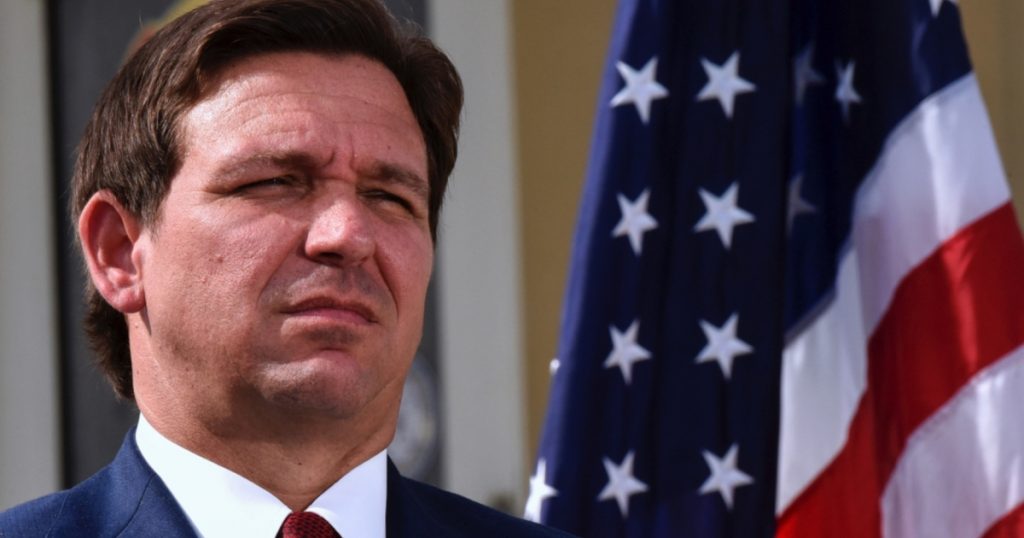Ron DeSantis’ War on Freedom
Paul Hennessy/AP
Editor’s note: The below article first appeared in David Corn’s newsletter, Our Land. The newsletter is written by David twice a week (most of the time) and provides behind-the-scenes stories about politics and media; his unvarnished take on the events of the day; film, book, television, podcast, and music recommendations; interactive audience features; and more. Subscribing costs just $5 a month—but you can sign up for a free 30-day trial of Our Land here. Please check it out. And please also check out David’s new New York Times bestseller, American Psychosis: A Historical Investigation of How the Republican Party Went Crazy.
Freedom—it’s what Republicans and conservatives have long insisted they care most about. At campaign rallies and conservative shindigs, they get all weepy when Lee Greenwood sings, “I’m proud to be an American, where at least I know I’m free.” For decades, they have accused their political foes of seeking to destroy freedom by imposing socialism, communism, Bolshevism, collectivism, or whatever upon the US of A. This has been a ruse. The right has often been an enemy of freedom. For instance, conservatives have sought to limit the reproductive choices of women and prevent Americans from marrying the people they love. In recent weeks, we have seen a very specific assault on freedom in Florida waged by Republican Gov. Ron DeSantis, who is not yet a 2024 presidential candidate but who already seems to be competing with Donald Trump for the GOP leader most committed to authoritarianism—and who yesterday released a book with a highly ironic title: The Courage to Be Free.
Last week, two bills were introduced in the Florida legislature that would advance DeSantis’ crusade and limit important freedoms for Floridians. The first continues DeSantis’ long-running attack on the Sunshine State’s education system, which has included banning math textbooks that he claimed included “woke” ideology, prohibiting classroom instruction on sexual orientation and gender identity, thwarting the introduction of an AP African American studies course (and threatening to kill all AP courses), and deriding “liberal indoctrination” in the school system. The laws he has already passed have led to book banning in some school districts.
This new measure would block public colleges and universities from offering major or minor degrees in gender studies, intersectionality, or critical race studies. (Several Florida schools offer gender studies majors; it’s unclear whether any does so for critical race theory.) The measure also would compel colleges to offer general education classes that do not “suppress or distort significant historical events or include a curriculum that teaches identity politics.” These courses must “promote the philosophical underpinnings of Western civilization.”
This legislation, filed by GOP state Rep. Alex Andrade, a DeSantis ally, establishes the state government as an education censor, preventing schools, faculty, and students from determining the contours of college education. Andrew Gothard, president of United Faculty of Florida, the union representing instructors at Florida schools, described the bill to Higher Ed Dive as a state-sponsored form of indoctrination. He called it “fascism in its purest form.”
The legislation would place the decision to hire faculty members at public colleges in the hands of campus governing boards that would ultimately be controlled by the governor. It would prevent schools from funding diversity, equity, and inclusion programs.
This is a power grab—and a mind grab. DeSantis is seeking control over what is taught. The legislation would require general education courses to “promote the values necessary to preserve the constitutional republic”—without fully defining these “values.” (Isn’t respect for diversity in a diverse country such a value?) These courses cannot describe American history “as contrary to the creation of a new nation based on universal principles stated in the Declaration of Independence.” So what to say about the central role of slavery in the US economy and power structure? Even though the founding fathers were conflicted about slavery, the course material cannot reflect that? One main problem with legislation of this sort is that because it does not provide specific guidelines, schools and teachers will self-censor to avoid being called out by the Orwellian thought-police of the state bureaucracy. (You have undermined the “values necessary to preserve the constitutional republic.” Please come with us.) Which is precisely DeSantis’ goal.
“This bill will be a gut punch to anyone who cares about public education in a democracy or academic freedom or the fact that our system of higher education is the envy of the world,” Irene Mulvey, president of the American Association of University Professors, told the Chronicle of Higher Education. “Because higher ed in America is organized around the fact that research and teaching and decisions involving research and teaching are best made by experts and scholars in the field.”
The other anti-freedom measure—also introduced by Andrade—would make it easier to bring a defamation case against the news media, which DeSantis last year identified as a priority for his administration. This legislation would especially help plaintiffs who have been accused of prejudice. As the Tampa Bay Times reports, the bill could have “a chilling effect on news outlets reporting about people accused of discriminating against others on the basis of race, sexuality or gender identity, legal experts say.” The paper explains:
In cases involving a person reported to have committed sexuality-based or gender identity-based discrimination, the bill limits the defenses available to the publisher being sued. An outlet accused of defamation cannot prove its reporting was factually sound by citing the person’s religious or scientific beliefs, the bill says.
The bill is designed to render it difficult—and legally perilous—to call out racists, bigots, and misogynists. It also applies to social media. A tweeter could be slapped with a defamation suit for posting such an allegation.
There are other worrisome provisions in the bill. For instance, it would require that a statement provided by an anonymous source be presumed false for the purposes of a defamation case. This could dramatically inhibit the use of anonymous whistleblowers and witnesses by news organizations. Certainly, one can debate the value and over-usage of unidentified sources. But they are often necessary for journalism that scrutinizes powerful people and interests.
Kate Ruane, director of PEN America’s US Free Expression Programs, slammed this bill:
With this legislation, Florida politicians seek to insulate themselves from criticism and weaponize the courts to chill speech and attack journalists. It’s blatantly unconstitutional, but could still wreak tremendous havoc if it passes. The United States has a long tradition of open and robust political debate, which has been underpinned by a strong and free press that need not fear a lawsuit for doing their jobs. This bill will hobble reporters as they investigate the impacts of the implementation of policies like the Stop W.O.K.E. Act and the “Don’t Say Gay” Law.
DeSantis and his minions are mounting an assault on essential freedoms: academic freedom and the free press. In the ways of demagogues, he is trying to seize greater control of campuses and curb news outlets from investigating folks like him. The defamation bill even affords special protection to people accused of racism and gender bigotry. Whether or not he runs for president—this past weekend he assembled donors and political supporters for a conference that could be a prelude to an announcement declaring his candidacy—DeSantis is cruising full speed ahead to wage culture wars and impose MAGA extremism on his state, blazing the trail for other would-be autocrats.
“I’ve never seen anything like it,” Mulvey of the American Association of University Professors says. “The future of higher education is at stake. If it works in Florida, you know it’ll spread to other red states.” Trump raised the bar for right-wing politicians who fancy authoritarianism—and DeSantis is clearing it.





